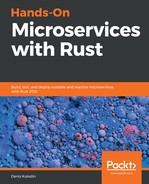There are enough functions in the std::env standard module to work with environment variables. It contains the var function to read external values. This function returns a Result with a String value of the variable if it exists, or a VarError error if it doesn't exist. Add the import of the env module to your main.rs file:
use std::env;
We need to replace the following line:
let addr = ([127, 0, 0, 1], 8080).into();
Replace it with the following:
let addr = env::var("ADDRESS")
.unwrap_or_else(|_| "127.0.0.1:8080".into())
.parse()
.expect("can't parse ADDRESS variable");
This new code reads the ADDRESS value. If this value doesn't exist, we won't let the code throw a panic. Instead, we will replace it with the default value, "127.0.0.1:8080", using the unwrap_or_else method call. As the var function returns a String, we also have to convert &'static str into a String instance with the into method call.
If we can't parse an address, we will throw a panic in the except method call.
Your server will now use the addr variable, which takes a value from the ADDRESS environment variable or from the default value.
Environment variables are a simple way of configuring your application. They are also widely supported with hosting or cloud platforms and Docker containers.
